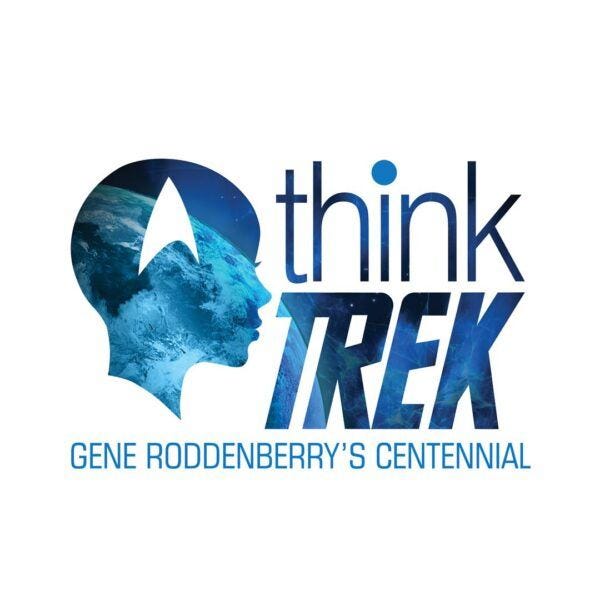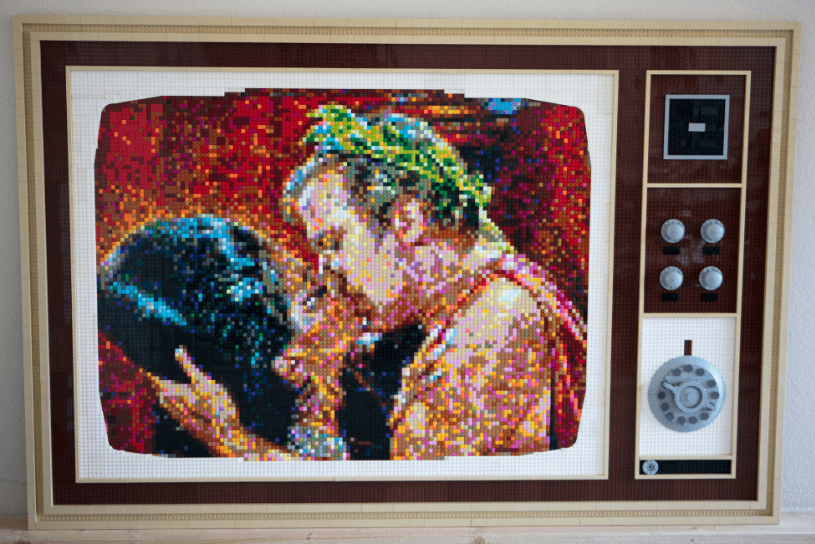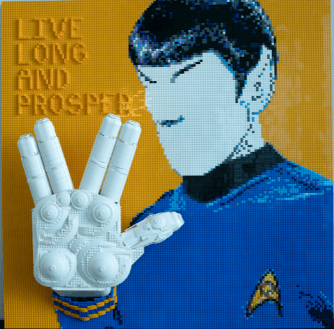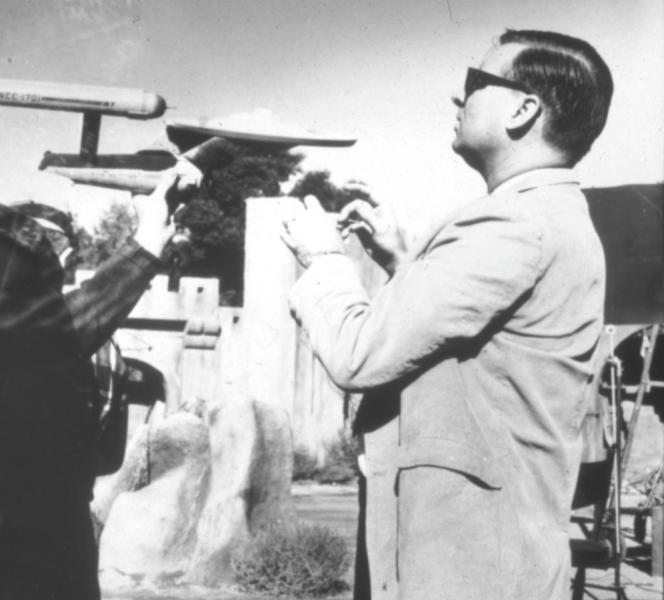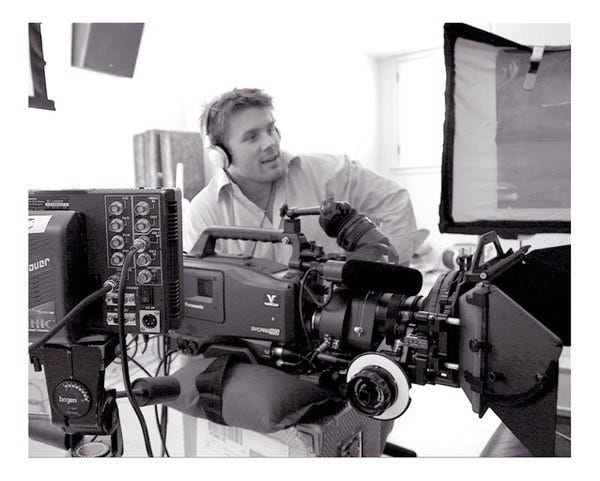Rod Roddenberry talks ‘Star Trek’ Creator Gene Roddenberry 100th Birthday plus our future
Click to read the full story: Rod Roddenberry talks ‘Star Trek’ Creator Gene Roddenberry 100th Birthday plus our future
Today would have been the 100th birthday of “Star Trek” creator Gene Roddenberry, whose innovative television show in the 1960s has had a tremendous impact on not only its fans but on the broader culture as well. With ten television series and counting, and thirteen feature films, “Star Trek” continues to accumulate new fans as well as people who have counted themselves as fans for the past half a century.
In some cases, entire families are multi-generational “Star Trek” fans, passing on an appreciation for the franchise and what it stands for. There’s a new podcast just beginning, and a live showing of the “Star Trek: IV” movie in theaters this week, with a remastered version for the film’s 35th anniversary. Last week Creation Entertainment brought actors and fans together for its 55th anniversary “Star Trek” convention in Las Vegas.
The “Star Trek” fandom has the same longevity. For many people, fandom and “Star Trek” are synonymous – the stereotype of ‘fan’ is a guy dressed as a Klingon at a convention. “Star Trek” fans are not all cosplayers or convention-goers, but they have been passionate from the start. Some of the first fan gatherings were for “Star Trek,” as was the first successful attempt at a fan campaign to get a show renewed. Writing actual letters to the network got “Star Trek” its third season for the original series. What has made this show and its multifaceted universe so popular and so enduring?
“Star Trek” has been, from the start, a philosophical show with a lot to say about humanity and how we are interconnected with each other and with the rest of the universe. Gene, and showrunners and writers after him, used the medium of science fiction to address social issues of the time that they might not have been able to talk about directly otherwise.
Gene infused the show with his personal beliefs and an ethical foundation that has remained over the decades, insisting on a racially diverse show with women in positions of power at a time when that was not the norm. He did not shy away from exploring and interrogating the challenges we face, from racism and sexism to xenophobia and prejudice. Those themes are perhaps more relevant than ever.
Roddenberry was also a believer in not being afraid of science, and a proponent of the quest for knowledge. “To boldly go where no one has gone before” described his refusal to be afraid of the unknown, encouraging exploration not just of the final frontier of space but also of our own human failings. At the same time, “Star Trek” is ultimately a hopeful vision of the future. Gene believed that we were capable of being better, and that given enough time, we would shape a better world. He stressed the importance of humans working together for the common good, which is more critical than ever in the midst of a global pandemic.
Those beliefs and values shaped generations of “Star Trek” viewers. Popular media has a significant impact, and a franchise that has been in existence for over half a century has had time to have greater impact than most. The show has even inspired countless fans to pursue their own real life quests for knowledge, with many finding careers as scientists, mathematicians, chemists, astrophysicists.
To celebrate Gene Roddenberry’s centennial, Roddenberry Enterprises, helmed by Gene’s son Rod, launched a series of multi-media ways to remember the show and how it has inspired people over the past several months. On social media, #talkTREK shared many of Gene’s quotes, read by the actors, writers, scientists and others who have been part of the “Star Trek” universe.
Whoopi Goldberg’s reminded us that Gene believed in humanity – a reminder and some hope that feels more needed than ever.
The Roddenberry Daily Quote featuring @WhoopiGoldberg. Enjoy!@StarTrek @StarTrekNetflix @StarTrekOnPPlus #quotes pic.twitter.com/NNNVnaukYY
— Happy 100th Gene Roddenberry! #gene100 (@roddenberry) August 17, 2021
Even NASA is in on the celebration, holding a panel this afternoon including Rod Roddenberry and George Takei from the original series.
100 years after Star Trek creator Gene Roddenberry was born, we'll help send his legacy of inspiration, hope, and diversity out into the cosmos.
On Thurs. Aug. 19 at 2pm ET, tune in for a #Roddenberry100 program with NASA panelists & @GeorgeTakei: https://t.co/yqQGEB9Sib pic.twitter.com/zRDvuRwrqV— NASA (@NASA) August 17, 2021
The #seeTREK hashtag shared art and other creative projects inspired by the show and its characters, a reminder of the messages carried by the many incarnations of “Star Trek” (you can see some of those impressive block builds in this article). I met Rod at a “Star Trek” convention over a decade ago, and last week was able to spend some time talking to him again – about his father, the centennial celebration, and why “Star Trek’s” philosophy and values resonate so much today.
Lynn: With your father’s 100th coming up, a lot of us have been looking back at the messages he was trying to deliver with “Star Trek” and it’s been emotional for me to revisit some of his quotes and some of the themes of the show. I think that’s partly nostalgia, but it’s also that the themes that made the show resonate with so many people over the decades are still relevant. The importance of embracing diversity, that the only way we’ll survive is through collaboration and mutual respect, that seems so important right now.
Rod: “Star Trek’s” backbone philosophy is IDIC, Infinite Diversity in Infinite Combinations. And of course, the idea in “Star Trek” is you’re never going to get out into the universe and we’re never going to evolve intellectually until we realize that it is the differences between us that are what is special, and learning about those differences and growing from them is how we make that “Star Trek” future a reality. They weren’t just out in space finding aliens that looked weird, they were trying to find intelligent species in our universe that looked at the universe in a different way. Because they knew that any life form, whether on earth or somewhere else, that had a unique perspective, was something we could learn from. We didn’t have to agree with it, we didn’t have to think it was right, but to hear a different perspective on something helps us grow as a person. It helps us form our perspective on life and the universe. Sometimes we’ll hear something and think, that’s great, I’m gonna take that in and incorporate that. Or, I don’t want any of that, let’s push that away. But we’ve gotta be listening. If we don’t, if we live in our bubbles, we will not get any further than we are right now.
Lynn: Yes, and I think sometimes we do get stuck, and we do forget to listen.
Rod: Some of us do that – our species has been evolving, albeit sometimes incredibly slowly.
Lynn (laughing): It feels that way.
Rod: I wrestle with the idea of how far we’ve come from the 1960s. I’d like to give us credit on some level – we’ve certainly made technological advances – and in terms of social justice, I’d like to believe that we’ve made advances, but the messages that “Star Trek” had then are just as important. Some might say more important today. So it really is that IDIC philosophy that’s crucial, and what this [celebration] is all about. I’m doing this to celebrate my father’s 100th birthday, but not just to celebrate a man who passed away twenty plus years ago. It’s the ideas behind that, it’s those ideas that are infused into Star Trek. This is the platform to get those ideas back out there. Our society, we need it desperately. We’ve probably needed it for our entire existence, but in terms of Star Trek, from the sixties until now, let’s keep it going.
Lynn: And I do feel like so many of the ideas from “Star Trek” are more relevant than ever. I’m a psychologist who studies fandom, and I revisited your documentary film ‘Trek Nation’ recently and was struck by several things I didn’t focus on the first time I saw it. It’s sort of like you went on a journey of discovery, asking why fans loved Star Trek so much, and you discovered what I’ve found in so much of my research and write about in my books – that being a fan can be a really healthy positive thing. It can inspire creativity, provide comfort and community, can change beliefs and inspire hope. What do you feel like you learned about fandom from making that film?
Rod: Early on, what it became was discovering the breadth and diversity of the kinds of fans who are out there. I truly, for the past twenty plus years of my life, have been traveling the world meeting fans from all over, whether at a convention or just traveling, and to meet people who are, let’s say, highly religious in one faith and people who are highly religious in another, or politicians, or NFL players, or movie stars. You name it, there are people out there who all agree with this common idea of humanity coming together as one. We are one species, of course, but I guess, as one planet.
Lynn: I was also struck by the fact that, in watching the documentary again, you kinda strike the same tone that your father always did – accepting, nonjudgmental, hopeful. Positive.
Rod: I attempt that. It’s sometimes difficult. I’ve moved a little bit from IDIC to empathy. They’re not one in the same but they’re closely related. Right now in this world, I think what we need is a lot more empathy. And by empathy, I mean not sympathy, not feeling bad for someone, but truly trying to understand them. Trying to step out of yourself and see them from a different point of view. Which “Star Trek,” when it was at its best, did that. On a daily basis, I look at the news and say, what a bunch of idiots! But there are moments, and trust me, I don’t do it often but I’m very proud of myself when I do because it’s a hard thing for any of us to do, but if I can say, you know what? I remember a year ago when I behaved like that, or when I was in that situation and I was kind of an ass or whatever. To be able to make that connection and then have a little more compassion as opposed to judgment, hatred or anger? It’s really a paradigm shift, and if we can all start to do that more often – it’s not going to happen overnight – but if we can all slightly increase that in ourselves a bit, I think we will advance forward faster as a species. It sounds preachy, and I’m not saying I always do it, but I have done it.
Rod went on to relate that challenge to politics and how we all get emotional and start to see others as evil or idiots, and specifically his own struggle with the last president.
Rod: I understand that a person is the way they are because of their experiences, how they were brought up. We are shaped by our surroundings and these are fears and insecurities that they have in themselves. That’s an extreme situation, but we can do that same thing much simpler with the people around us on a daily basis.
Lynn: It’s true, we are all impacted by our environments, even when we don’t realize it. The other thing that struck me as a psychologists watching “Trek Nation” again recently was how much the making of the film was about your own quest to discover your father. I teach a graduate course in grief and loss to future counselors, and one technique that helps a lot of people, especially if you loved the person you lost but felt you didn’t know them that well, is to write a ‘biography’ of the lost person, talking to people who knew them in ways you didn’t – it helps us reconcile the images we all construct of our parents as larger than life with their actual human flaws that impacted us. It seemed like you related to his vision of the world, and that was common ground you could find with him even after he was gone. Like embracing your father’s vision was a way of embracing him and staying connected to him, in spite of his flaws. Does that resonate with you?
Rod: Yes, most of what you say does. Taking on those philosophies I think began before that. It’s not that he and I sat down and talked philosophy, because we never really did, but I think simply by being in proximity and having the life I did, they were around me and I think slowly may have seeped in. Certainly once again influenced by my surroundings. I’ve had many privileges, but one of the greatest was having a father that I could go around [after he died] and talk to so many people and learn about him. And on some level – I would like to say unbiased people, though I’m sure some of them weren’t – but I got the spectrum. There were people who never made it to the documentary that I spoke with off camera that didn’t like my father, and then I had the people who adored him. And what was beautiful is, then I was able to find this man, this human, in the middle. And it sounds stupid for me to call him a human, of course he was human, but so many people idolized him that it was hard to get a real understanding of him. It’s so interesting to hear that there’s a grief process that is sort of like this, because that’s exactly what it did for me. And it worked on many levels, not just the loss of my father, but trying to figure out who I am too.
Lynn: That’s so much of a part of loss for us as humans – we lose someone important to us, and then have to figure out, who am I now, after that person is gone? It’s a big part of the adaptation process.
Rod: Yes, like am I trying to be the next Gene Roddenberry? Am I supposed to be? Am I following in his footsteps? Who the hell am I? It really was a journey. The documentary wasn’t about me, so a lot of that journey never made it onscreen, and that’s fine, because that part was my journey. That’s not the story we were trying to tell. But there was such a cathartic, growing part of that experience for me that will never be seen by anyone else, but it was a wonderful opportunity.
Lynn: I’m going to recommend the film to my grad students. Even if you didn’t consciously know you were doing that, you can see your evolution over the course of the documentary, and it’s a powerful journey.
Rod: I appreciate that very very much.
Lynn: Okay, last question. We’re dealing with a pandemic which is literally requiring us all to boldly go where no one has gone before. Are there messages from “Star Trek” that are directly related to the pandemic?
Rod: I struggle with this at different times with a different point of view. I’m just going to be bluntly honest with you – my daily comment is that we’re screwing ourselves again, we’re a bunch of dumbasses, we’re gonna end up right back where we were.
Lynn: That’s what I’m afraid of!
Rod went on to acknowledge his privilege in having had many life experiences and being exposed to a lot of intelligent people all over the world.
Rod: I’m not super intelligent, just a basic well-rounded person, but there are so many people who haven’t had those experiences and are stuck in this place of fear and uncertainty. It’s been going on for a while, but it certainly has been exacerbated by our last political leaders. It’s unfortunate because I know people who say, I’m scared to get the vaccine. These are people I know and respect, normal people, and I don’t have enough of the scientific knowledge to try to convince them. It’s sort of like religion too, what you believe is what you believe. People are a little trapped in that area. So, I feel a little lost right now because I don’t want to put my beliefs on them, but then I go to, well science isn’t my beliefs, science is science. So, it’s an internal struggle right now. I do think “Star Trek” can play a part – the ideas, the empathy, the compassion can play a part.
Lynn: Definitely.
Rod: I’m passionate about the vaccine, that it’s really going to save us here.
Lynn: I feel like that goes back to “Star Trek” too – we have to do this together. We have to care about each other and think of the common good. And that takes us right back to the themes we started with.
Rod: If I can throw out the word ‘education,’ which is a loaded word – I don’t mean STEM necessarily, I just mean life perspective, experience. If we can do more with ethics and empathy and these sorts of things at a younger age, I don’t think we’ll have people that live in so much fear, because they’ll be able to use their critical thinking to get out of those mindsets. It’s a multi-generational change.
Lynn: You don’t have to convince me, you’re talking to a professor here! The better we all are at critical thinking, the less vulnerable we are to all the misinformation that’s out there.
Rod: I can’t wait to read what you write.
We ended our conversation and all I could think was how much Rod, from what I know of Gene, really is like his father. He is quick to acknowledge his own privilege and awareness that he doesn’t know it all by any means, but he is also open and eager for knowledge. He understands and shares with his father the values and beliefs that have infused the “Star Trek” universe from the beginning, but isn’t naïve about the complexity of the ethical dilemmas facing humanity right now.
I think he’s onto something, that Star Trek’s ideas – a half-century later – can help us navigate the challenges of 2021. We can’t be afraid of seeking out new knowledge and new ideas or counting on science. Infinite diversity in infinite combinations is what makes the world beautiful. Humanity working together for a common good is what will save us.
I can’t think of a better person to bring Gene Roddenberry’s ideas into the future than his son.
The post Rod Roddenberry talks ‘Star Trek’ Creator Gene Roddenberry 100th Birthday plus our future appeared first on Movie TV Tech Geeks News By: Lynn Zubernis

